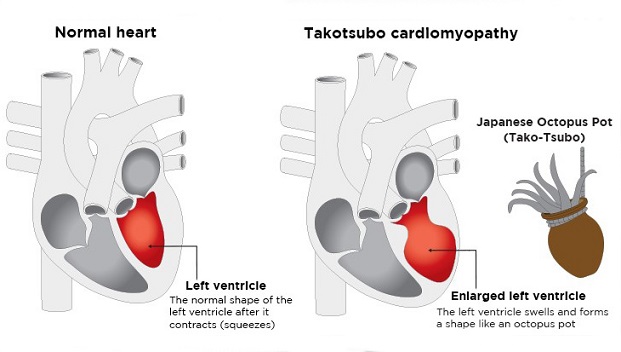WARNING! Although Rare, COVID-19 Induced Cases Of Stress Takotsubo Cardiomyopathy Rising!
Nikhil Prasad Fact checked by:Thailand Medical News Team Feb 27, 2024 1 year, 4 weeks, 9 hours, 10 minutes ago
COVID-19 News: In the intricate tapestry of the COVID-19 pandemic's impact on human health, a less-explored facet involves the surge of stress cardiomyopathy (SCM), specifically Takotsubo cardiomyopathy, induced by the SARS-CoV-2 virus. This phenomenon, colloquially known as "Broken Heart Syndrome," presents a transient clinical condition that mimics myocardial infarction, primarily affecting the apex of the left ventricle. This
COVID-19 News report delves into the rarity of COVID-19-induced cases of Takotsubo cardiomyopathy, shedding light on a comprehensive case presentation, diagnostic criteria, potential etiologies, management strategies, and the unique challenges posed by the virus in exacerbating SCM.
 Although Rare, COVID-19 Induced Cases Of Stress Takotsubo Cardiomyopathy Rising!
Although Rare, COVID-19 Induced Cases Of Stress Takotsubo Cardiomyopathy Rising!
Besides this case report presented by researchers from UCSF Fresno-USA and Alfaisal University, College of Medicine-Saudi Arabia, a number of case reports and studies have also been published on COVID-19 infections causing Takotsubo Cardiomyopathy.
https://www.scielo.br/j/ijcs/a/gxsTcYyxj7T97FX3Gg4Rjzf/?format=pdf&lang=en
https://www.cureus.com/articles/101214-takotsubo-cardiomyopathy-as-a-cardiovascular-manifestation-of-covid-19-a-case-report-and-literature-review#!/
https://www.cureus.com/articles/134462-biventricular-takotsubo-cardiomyopathy-secondary-to-covid-19#!/
https://www.cureus.com/articles/104995-covid-19-resulting-in-global-stress-cardiomyopathy-in-a-young-female#!/
https://www.cureus.com/articles/63627-coronavirus-disease-2019-covid-19-induced-takotsubo-cardiomyopathy-prognosis-in-geriatric-setting#!/
https://www.cureus.com/articles/86650-takotsubo-cardiomyopathy-a-covid-19-complication#!/
https://www.cureus.com/articles/170541-takotsubo-cardiomyopathy-associated-with-acute-covid-19-pneumonia#!/
https://www.frontiersin.org/articles/10.3389/
fcvm.2021.614562/full
https://academic.oup.com/eurheartj/article/41/19/1860/5819800
https://academic.oup.com/ehjcr/article/4/FI1/1/5897708
https://casereports.bmj.com/content/13/12/e236811
https://www.sciencedirect.com/science/article/pii/S2666084920304290
https://www.mcpiqojournal.org/article/S2542-4548(20)30161-2/fulltext
https://onlinelibrary.wiley.com/doi/10.1002/hsr2.972
https://www.sciencedirect.com/science/article/pii/S0146280620302395
https://www.frontiersin.org/articles/10.3389/fcvm.2022.919715/full
https://casereports.bmj.com/content/13/6/e236561
https://www.imrpress.com/journal/RCM/23/9/10.31083/j.rcm2309298/htm
https://www.mp.pl/paim/issue/article/16255/
https://link.springer.com/article/10.1007/s42399-020-00703-4
https://www.ahajournals.org/doi/10.1161/CIRCIMAGING.120.011222
Although rare, incidences of COVID-19 induced cases of Stress Takotsubo Cardiomyopathy are rising! It is believed that the newer SARS-CoV-2 strains and sub-lineages such as XBB, JN.1 and their various spawns along with reinfections and constant COVID-19 vaccines could be contributing factors to this increasing incidences!
Understanding Takotsubo Cardiomyopathy: A Multifaceted Exploration
Takotsubo cardiomyopathy, also recognized as stress cardiomyopathy, stands as a distinct entity in the realm of non-ischemic cardiomyopathies, with its prevalence notably higher in postmenopausal women. This condition is characterized by temporary left ventricular regional systolic dysfunction, occurring without the traditional markers of abrupt plaque rupture or angiographically severe coronary artery disease. The manifestation of Takotsubo cardiomyopathy strikingly mirrors acute coronary syndrome, presenting with symptoms such as chest pain, dyspnea, and syncope. The trigger, often a significant emotional or physical stressor, precedes the onset of apical ballooning of the heart and acute left ventricular dysfunction.
The most common symptoms are the abrupt (acute) onset of crushing chest pain and difficulty breathing (dyspnea). Anxiety, sweating (diaphoresis), nausea, vomiting, palpitations, and transient loss of consciousness (syncope) can also occur. The apical ballooning syndrome is an intriguing medical condition as it mimics acute coronary syndromes. Similarities in presentation can in fact mimic a classic heart attack. Common symptoms include chest pain, shortness of breath and dyspnoea, arrhythmias or generalized fatigue.
Case Presentation: A Glimpse into Complexity
A compelling case unfolded as a female in her sixties, bearing a medical history of hypertension, hyperlipidemia, and chronic obstructive pulmonary disease (COPD), presented to the emergency department with sudden-onset chest pain. This pain, sharp and intermittent, was accompanied by escalating shortness of breath. Intriguingly, the patient had been in contact with a COVID-19-positive individual, and she had previously battled COVID-19 three months before this admission. The complexity deepened as initial vital signs indicated tachycardia, tachypnea, and low oxygen saturation, prompting a comprehensive investigation into the potential interplay between COVID-19 and the emergence of Takotsubo cardiomyopathy.
Diagnostic Challenges: Navigating the Labyrinth
The initial diagnostic considerations leaned towards pulmonary embolism, given the patient's symptoms and chest imaging findings. However, the elevation of troponin levels and EKG changes raised concerns about myocardial infarction. The subsequent coronary angiography revealed no evidence of coronary artery disease but unveiled an estimated ejection fraction of 10 - 15%, steering the diagnostic spotlight towards Takotsubo cardiomyopathy.
Diagnostic Criteria and Imaging: The Unveiling Continues
The Mayo Clinic Criteria for stress cardiomyopathy serve as a robust framework, demanding the presence of transient left ventricular dysfunction, EKG abnormalities, a stressful trigger, and the absence of obstructive coronary disease. Imaging techniques, including echocardiogram and cardiac MRI, take center stage in confirming the diagnosis. Echocardiography in this case depicted global hypokinesis, while cardiac MRI unfolded a hyperdynamic basal segment and severely hypokinetic mid to apical ventricle, aligning with the classical features of Takotsubo cardiomyopathy.
Management Strategies: Navigating Uncharted Territories
The management of Takotsubo cardiomyopathy lacks a standardized protocol, relying on clinical experience and expert opinion. Initial treatment encompasses aspirin, ACE inhibitors, beta-blockers, and lipid-lowering drugs. Coronary angiography plays a pivotal role in ruling out obstructive coronary artery disease. Inotropes may be administered in cases of cardiogenic shock, while anticoagulation is considered in the presence of embolic events or ventricular thrombus.
Etiologies and COVID-19 Association: Unraveling the Web
The elusive etiology of Takotsubo cardiomyopathy remains a subject of ongoing exploration. Proposed theories include sympathetic overdrive, microvascular dysfunction, inflammation, low estrogen levels, and defective myocardial fatty acid metabolism. In the context of COVID-19, a complex interplay of factors such as excessive cortisol levels, elevated catecholamines, procoagulant conditions, and proinflammatory cytokine storms may contribute to the development of Takotsubo cardiomyopathy.
Conclusion: Bridging Gaps in Knowledge
As the medical community navigates the complex landscape of COVID-19-induced Takotsubo cardiomyopathy, this article endeavors to provide a comprehensive exploration of its multifaceted dimensions. The presented case highlights the diagnostic intricacies, management nuances, and the imperative need for a deeper understanding of the intricate interplay between COVID-19 and cardiovascular complications. Continued research and clinical vigilance are paramount in unraveling the complexities surrounding this emerging facet of the pandemic and refining therapeutic interventions to enhance patient outcomes.
The case study and findings were published in the peer reviewed journal: Global Cardiology Science and Practice.
https://globalcardiologyscienceandpractice.com/index.php/gcsp/article/view/628
For the latest
COVID-19 News, keep on logging to Thailand Medical News.
Read Also:
https://www.thailandmedical.news/news/breaking-japanese-scientists-warn-of-imminent-heart-failure-pandemic-millions-predicted-to-die-due-to-rampant-sars-cov-2-viral-persistence-in-heart
https://www.thailandmedical.news/news/breaking-covid-19-news-japanese-scientists-warns-of-imminent-cardiac-failure-crisis-as-all-exposed-to-sars-cov-2-have-reduced-heart-function
https://www.thailandmedical.news/news/breaking-covid-19-news-wisconsin-study-shows-that-sars-cov-2-causes-cardiac-fibrosis-many-could-die-suddenly
https://www.thailandmedical.news/news/european-society-of-cardiology-warns-that-covid-19-affects-heart-in-many-ways--fatalities-and-excess-deaths-due-to-covid-19-induced-heart-issues-risin
https://www.thailandmedical.news/news/gene-that-causes-cardiomyopathy-and-blindness-discovered-along-with-treatment-using-taurine-supplements
